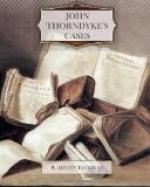“You are really very good,” said Thorndyke warmly. “I will just run into the chemist’s next door, and get a suitable bottle, and then I will avail myself of your exceedingly kind offer.”
He hurried into the chemist’s shop, from which he presently emerged, carrying a white paper parcel; and we then followed the butcher down a narrow lane by the side of his shop. It led to an enclosure containing a small pen, in which were confined three handsome steers, whose glossy, black coats contrasted in a very striking manner with their long, greyish-white, nearly straight horns.
“These are certainly very fine beasts, Mr. Felton,” said Thorndyke, as we drew up beside the pen, “and in excellent condition, too.”
He leaned over the pen and examined the beasts critically, especially as to their eyes and horns; then, approaching the nearest one, he raised his stick and bestowed a smart tap on the under-side of the right horn, following it by a similar tap on the left one, a proceeding that the beast viewed with stolid surprise.
“The state of the horns,” explained Thorndyke, as he moved on to the next steer, “enables one to judge, to some extent, of the beast’s health.”
“Lord bless you, sir,” laughed Mr. Felton, “they haven’t got no feeling in their horns, else what good ’ud their horns be to ’em?”
Apparently he was right, for the second steer was as indifferent to a sounding rap on either horn as the first. Nevertheless, when Thorndyke approached the third steer, I unconsciously drew nearer to watch; and I noticed that, as the stick struck the horn, the beast drew back in evident alarm, and that when the blow was repeated, it became manifestly uneasy.
“He don’t seem to like that,” said the butcher. “Seems as if—Hullo, that’s queer!”
Thorndyke had just brought his stick up against the left horn, and immediately the beast had winced and started back, shaking his head and moaning. There was not, however, room for him to back out of reach, and Thorndyke, by leaning into the pen, was able to inspect the sensitive horn, which he did with the closest attention, while the butcher looked on with obvious perturbation.
“You don’t think there’s anything wrong with this beast, sir, I hope,” said he.
“I can’t say without a further examination,” replied Thorndyke. “It may be the horn only that is affected. If you will have it sawn off close to the head, and sent up to me at the hotel, I will look at it and tell you. And, by way of preventing any mistakes, I will mark it and cover it up, to protect it from injury in the slaughter-house.”
He opened his parcel and produced from it a wide-mouthed bottle labelled “Ox-gall,” a sheet of gutta-percha tissue, a roller bandage, and a stick of sealing-wax. Handing the bottle to Mr. Felton, he encased the distal half of the horn in a covering by means of the tissue and the bandage, which he fixed securely with the sealing-wax.




